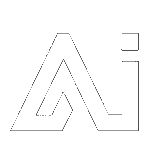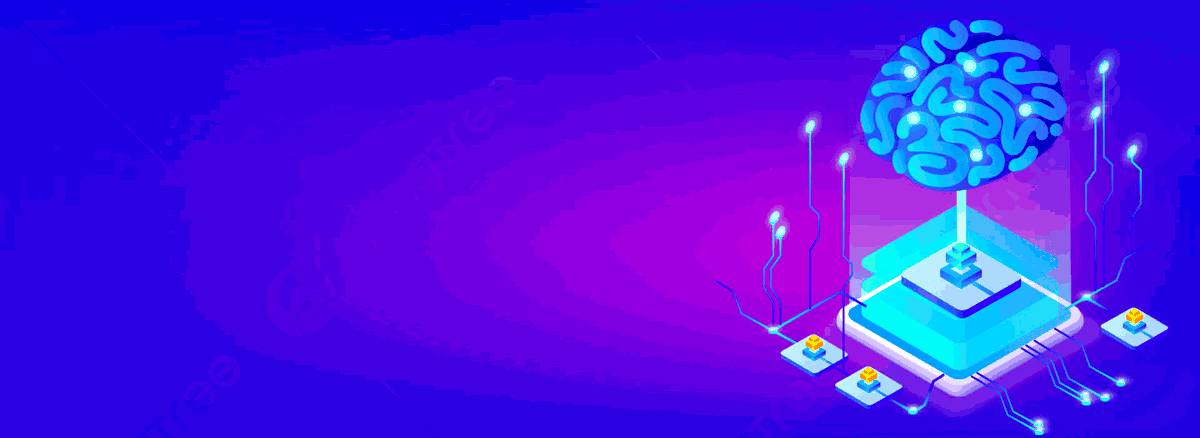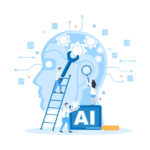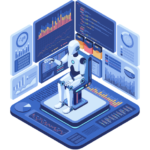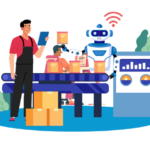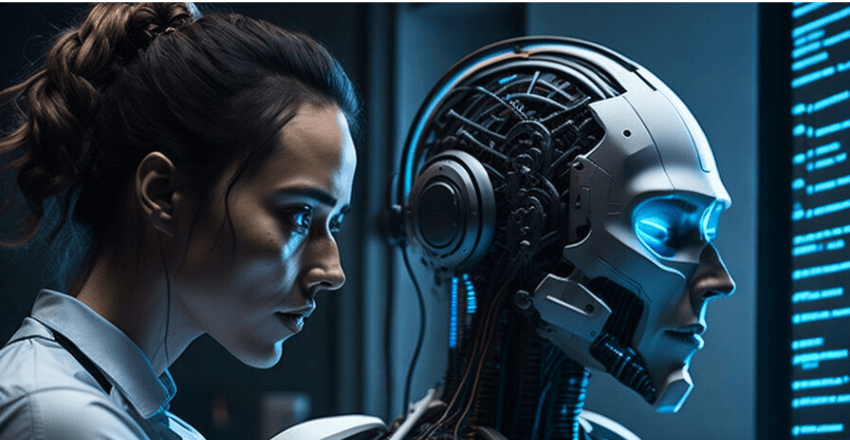 “Can AI Replace Human Software Developers?” Venture into this enthralling journey as we dissect the potential and pitfalls of AI in our digital craftsmanship.
“Can AI Replace Human Software Developers?” Venture into this enthralling journey as we dissect the potential and pitfalls of AI in our digital craftsmanship.
Can you imagine a futuristic world where software developers are no longer hunched over their desks, working tirelessly on lines of code, but instead are replaced by a machine-learning algorithm?
This might seem like a dystopian sci-fi movie to some, for others it’s a heated debate that stirs within the heart of the tech industry. Despite how unnerving this question may feel, it’s an important one to address as AI and machine learning become increasingly influential in our everyday lives and jobs.
Artificial Intelligence (AI) has been one of the most significant technological advancements of recent times, known for its ability to automate repetitive tasks and enable better decision-making. However, this has led to a growing debate regarding its potential to replace human labor, particularly in software development.
Why This Matters
With rapid advancement in machine learning capabilities and impressive feats like beating humans at chess or Jeopardy, the topic of AI taking over human jobs has become increasingly relevant. Among these professions, one stands out due to its intrinsic connection to technology: software developers.
Understanding this possible shift is crucial as it impacts job security, productivity, innovation and our relationship with technology itself.
The question remains whether AI has the capability to replace human software developers or whether it can augment their abilities.
Historical Context & Key Developments
AI has come a long way since its birth in the 1950s. Progressing from simple task automation to advanced problem-solving capabilities, AI now expands its influence into creative tasks often associated with human intellect— including software programming.
The debate of machines replacing humans is not a new phenomenon. It began with the industrial revolution, continued through the digital revolution, and is now again being refreshed with the AI revolution.
In each epoch, machines have enhanced productivity and efficiency, leading to job displacement in certain areas but creating new fields and opportunities.
Today’s trend towards automated coding paradigms – enabled by tools like GitHub’s CoPilot and OpenAI’s Codex – are stoking these fires further.
Understanding Artificial Intelligence in Software Development
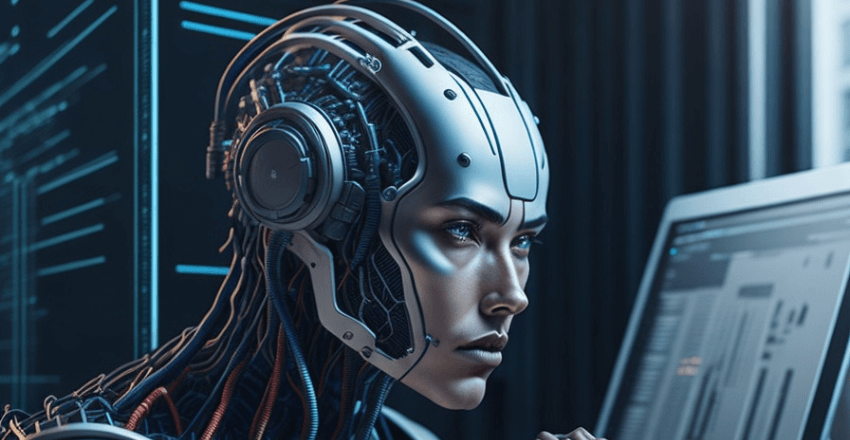
Artificial intelligence, or AI, is the simulation of human intelligence in machines that are programmed to think and learn like humans. In software development, AI can play a significant role in improving productivity and efficiency, as well as in enhancing the quality of code.
AI relies on a variety of techniques, including machine learning, natural language processing, and automation. Machine learning involves training algorithms to learn from data and make decisions, while natural language processing enables computers to understand and interpret human language.
Automation involves using software to automate tasks and streamline processes.
Applications of AI in Software Development
AI has a wide range of applications in software development, including:
- Code generation: AI can generate code based on user input or by analyzing existing code.
- Bug detection: AI can detect and identify bugs and errors, allowing developers to fix them more efficiently.
- Optimization: AI can optimize code for performance, memory usage, and other factors.
- Automated testing: AI can automate testing processes and identify issues early in the development cycle.
- Intelligent assistants: AI can provide recommendations and suggestions to developers based on their code and workflow.
Understanding Code vs Building Code
One key aspect of whether AI can replace developers revolves around whether AI understands code or simply processes it.
While AI tools can analyze code syntax and offer suggestions based on common patterns, they currently lack a deep “understanding” of what the code aims to achieve in abstract terms – something that human developers excel at.
For example:
def hello(name):
print("Hello", name)
hello("World")While an AI can match this basic Python code syntactically, it lacks the ability to truly understand that this function’s aim is to greet someone.
This demonstrates one significant hurdle for AI — its lack of nuanced understanding.
The Role of AI in Software Development
The role of AI in software development is to assist and augment human developers, not to replace them entirely. While AI can automate certain tasks and processes, human creativity and problem-solving skills are still essential for developing high-quality software.
AI can help developers work more efficiently, enabling them to focus on more complex tasks that require human expertise. It can also provide insights and recommendations that improve code quality and optimize performance.
Ultimately, the goal of AI in software development is to enable developers to work more effectively and to produce better software.
Advantages of AI in Software Development
Artificial intelligence (AI) has multiple benefits in software development, enabling developers to work more efficiently and effectively. By automating repetitive tasks and augmenting human decision-making,
AI can enhance productivity and code quality while minimizing errors and time to market. Here are some advantages of AI in software development:
| Advantage | Description |
|---|---|
| Efficiency | AI can perform tasks such as code generation, testing, and optimization much faster than humans, reducing development time and increasing throughput. |
| Automation | AI can automate routine tasks such as bug detection, freeing up human developers to focus on more complex and creative work. |
| Quality | AI can review code and identify potential defects or security vulnerabilities before they become major issues, improving overall code quality. |
| Decision-making | AI can analyze large volumes of data and provide insights to help developers make better decisions, such as choosing the most effective algorithm or selecting the best design pattern. |
Overall, AI is well suited to tasks that require pattern recognition, data processing, and decision-making. By leveraging AI’s strengths, software developers can create better products and deliver them faster to market.
Limitations of AI in Software Development

While AI brings numerous benefits to software development, it also has its limitations and challenges. Here are some of the potential issues to consider:
1. Lack of creativity and intuition
AI systems are only as effective as the data and algorithms they are programmed with. However, they lack the creativity and intuition that human developers bring to the table.
This is particularly important when it comes to tasks that require problem-solving, critical thinking, and decision-making based on incomplete or uncertain information. AI may struggle in these scenarios, where a human developer could excel.
2. Inability to handle ambiguous or complex tasks
AI is great at performing repetitive tasks and following predefined rules, but it may struggle with ambiguous or complex tasks. For example, AI may not be able to understand the nuances of natural language or the context behind user behavior.
This may limit its ability to perform tasks such as user testing, where human intuition and observation are crucial.
3. Dependence on quality data
AI algorithms require a significant amount of data to learn and improve their accuracy. However, the data used to train AI systems can be biased or incomplete, which can lead to inaccurate or unfair results.
Additionally, data privacy concerns may limit the amount of data that can be used to train AI systems, further restricting their effectiveness.
4. Need for human oversight and intervention
AI systems are not infallible and may make mistakes or produce unintended results. As such, they require human oversight and intervention to ensure that their output is accurate and aligned with the intended goals.
This means that human developers must remain involved in the software development process, even if AI is used to perform some tasks.
Overall, AI has its limitations in software development, but it can still be a valuable tool when used appropriately. Human developers must be aware of these limitations and ensure that AI is used in a way that complements their skills and expertise.
Collaboration Between AI and Human Developers
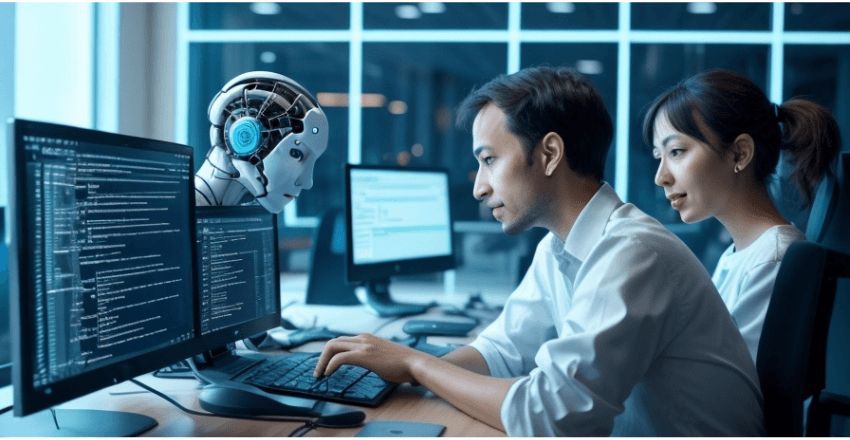
As the use of AI in software development continues to grow, there is a growing concern among developers about the possibility of AI replacing human software developers entirely.
However, a more likely scenario is one where AI and human developers work together in a collaborative environment to enhance the development process.
AI can assist human developers in a number of ways, from automating repetitive and time-consuming tasks to providing insights on code optimization and bug detection. This allows human developers to focus on more complex and creative tasks, such as designing user interfaces and developing new features.
Augmenting Human Capabilities
By working alongside AI, human developers can enhance their capabilities and improve efficiency. For example, AI-powered development environments can help developers to write better code by providing real-time feedback and suggestions on coding best practices and patterns.
Similarly, AI can help with testing and debugging by quickly identifying common errors and providing suggestions for resolution.
With the help of AI, developers can also create more intelligent and intuitive software that can learn from user behavior and personalize the user experience.
By combining human creativity and problem-solving skills with AI’s computational capabilities, developers can create software that is faster, more efficient, and more intuitive.
Ensuring Ethical Use of AI
One of the challenges of using AI in software development is ensuring that it is used in an ethical manner. Developers must be mindful of the potential biases and limitations of AI algorithms and take steps to ensure that the software they create is free from discrimination and respectful of user privacy.
Human developers play a key role in ensuring the ethical use of AI by monitoring the performance of the software and addressing any issues that may arise. This requires a deep understanding of how AI systems work, as well as a commitment to ethical and responsible development practices.
The collaboration between AI and human developers has the potential to transform the software development process, making it faster, more efficient, and more creative.
By working together in a collaborative environment, developers can leverage the strengths of AI and human intelligence to create software that is smarter, more intuitive, and more effective.
Impact of AI on Job Market for Software Developers

The rise of AI in software development has led to concerns about its impact on the job market for human software developers.
While some fear that AI will replace human developers entirely, others believe that AI will simply augment their roles.
Whichever side you fall on, it’s important to consider the potential consequences of AI on the job market for software developers.
One significant concern is the displacement of human workers. With AI taking on tasks like code generation, bug detection, and optimization, the need for human developers may decrease. This could lead to job losses and a shift in the skills needed for software development roles.
However, it’s important to note that AI may also create new job opportunities. As AI-related technologies continue to evolve, there will be a need for developers with the skills to create and maintain these systems.
Additionally, human developers may be needed to work alongside AI systems, designing and implementing solutions that take into account both technical and human factors.
Another potential impact of AI on the job market for software developers is the need for continuous learning and upskilling. As AI technologies become more prevalent in the field, developers will need to stay informed about the latest advancements and adapt their skillsets accordingly.
This may require ongoing education and training to keep up with the demands of the industry.
Overall, the impact of AI on the job market for software developers remains uncertain. While it may lead to some job displacement, it may also create new opportunities and require ongoing training and education.
As the industry continues to evolve, it’s important for developers to stay informed and adaptable in order to succeed in the age of AI.
Skills and Roles of Future Software Developers
Software developers are an integral part of the technology industry, and their role is evolving with the rapid advancements in AI. To stay relevant and competitive, software developers must adapt to the changing landscape of their profession and develop new skills to complement the capabilities of AI.
Some of the essential skills for future software developers include:
- Collaboration: The ability to work with AI technologies, understanding their strengths and limitations, and using them to complement human skills is crucial for future software developers. Collaborative skills will enable developers to create more efficient and effective software systems.
- Data analysis and interpretation: As AI emphasizes data-driven decision-making, future software developers must possess data analysis skills to effectively work with AI-powered systems.
- Continuous learning: The pace of technological advancements demands that software developers stay updated on the latest AI developments, trends, and tools.
- Creativity: While AI can automate many tasks, creative thinking is a unique human skill that is irreplaceable. Future software developers must learn how to blend automation with human creativity to develop innovative and effective software solutions.
The roles of future software developers may also change significantly. With AI automating many routine programming tasks, developers could shift their focus towards problem-solving, design, and testing.
Additionally, software developers may play a more significant role in developing AI technologies rather than just working with them.
Ethical Considerations in AI-Driven Software Development
The rise of AI in software development raises a number of ethical considerations that must be addressed to ensure responsible and ethical use of these technologies.
Bias in AI Algorithms – Can AI Replace Human Software Developers
One of the key ethical concerns with AI in software development is the potential for bias in AI algorithms. If the data used to train AI systems is biased, then the resulting algorithms will also be biased.
This can lead to unfair and discriminatory outcomes, particularly in areas such as hiring and lending where AI systems are used to make decisions. Developers must take steps to identify and eliminate biases in their AI algorithms to ensure fair and ethical outcomes.
Privacy Concerns – Can AI Replace Human Software Developers
Another ethical consideration with AI in software development is the potential for privacy violations. AI systems often require large amounts of data to function effectively, which can raise concerns about data privacy and security.
Developers must take steps to ensure that user data is collected and used in a responsible and transparent manner, and that appropriate safeguards are in place to protect user privacy.
Responsible Use of AI – Can AI Replace Human Software Developers
As with any technology, the responsible use of AI in software development is crucial to ensuring ethical outcomes. Developers must consider the potential impact of their AI systems on users, society, and the environment, and take steps to mitigate any negative effects.
This includes implementing appropriate controls to prevent misuse of AI systems, and ensuring that AI is used in a way that aligns with ethical and moral principles.
Current Applications of AI in Software Development
Artificial Intelligence (AI) has the potential to revolutionize the way we develop software.
Here are some examples of how AI is currently being used in this field:
| Application | Description |
|---|---|
| Code Generation | AI algorithms can automatically generate code, from simple functions to entire applications, by analyzing existing codebases and learning from them. |
| Bug Detection | By analyzing code for patterns and anomalies, AI can quickly detect potential bugs and suggest fixes before they cause problems. |
| Optimization | AI can analyze runtime behavior and other factors to suggest optimizations that can improve performance and reduce resource usage. |
| Automated Testing | AI can automatically generate and run tests for software applications, reducing the workload for human testers and increasing test coverage. |
| Natural Language Processing | AI can analyze and understand natural language, allowing developers to interact with code and tools using voice commands or text-based interfaces. |
These are just a few examples of how AI is already transforming the software development process. As the technology continues to evolve, we can expect even more advanced and powerful applications to emerge.
Challenges and Future Directions in AI-Driven Software Development
While the potential benefits of AI in software development are significant, there are also several challenges that must be overcome in order to fully realize its potential.
One of the biggest challenges is ensuring that AI systems are accurate and reliable. In order for AI to be effective in software development, it needs to be able to produce high-quality code that meets the needs of the project. This requires training and refining AI systems to minimize errors and bias.
Another challenge is ensuring that AI systems are secure and can protect sensitive data. As more and more software development tasks are automated using AI, it is crucial that systems are designed with security in mind to prevent cyber attacks.
In addition, there is a need for greater collaboration between AI and human developers. While AI can automate many routine tasks in software development, there will always be a need for human creativity and problem-solving skills.
Therefore, it is important to find ways to integrate AI tools seamlessly into the development process and ensure that human developers are properly trained to work alongside these tools.
The future of AI in software development is promising. As AI technology continues to evolve, we can expect to see increasingly sophisticated and powerful tools that can automate more complex tasks and improve the efficiency of the development process.
In addition, we can also expect to see AI-powered testing and debugging tools that can help developers identify and resolve issues more quickly and accurately.
Ultimately, the key to successful integration of AI in software development will be finding the right balance between automation and human creativity. By working together, AI and human developers can bring their unique strengths to the table and create software that is efficient, secure, and meets the needs of end-users.
Examples of: Successful Integration of AI in Software Development
Real-world examples demonstrate the potential of AI in software development, offering insights into how it can enhance productivity, efficiency, and code quality.
In this section, we explore some successful applications of AI in software development.
Example 1: Microsoft’s DeepCoder
Microsoft’s DeepCoder was designed to generate code automatically. By learning from millions of lines of existing code, DeepCoder can create programs that can perform certain tasks without human input.
This technology has the potential to revolutionize software development, as it can automate the creation of code, saving developers time and effort.
However, DeepCoder’s limitations should be considered. Currently, it can only generate simple code, and it requires a substantial dataset to learn from. Nevertheless, the potential impact of DeepCoder in software development continues to be explored, and it could be a valuable tool in the future.
Example 2: IBM’s Watson
IBM’s Watson is an AI-powered system that can analyze natural language and generate insights. In the context of software development, Watson can help developers to identify patterns and potential bugs in code, thereby improving code quality and reducing the time spent on manual code review.
Watson has been successfully integrated into software development processes, and it has demonstrated a significant impact on productivity and efficiency.
Example3: Google’s AutoML
Google’s AutoML is an AI platform that helps developers to create custom machine learning models without extensive knowledge of machine learning. This platform provides developers with pre-built models and tools to fine-tune them for specific applications.
AutoML can reduce the time and resources required to create machine learning models, enabling developers to focus on other aspects of software development.
AutoML has been used successfully in various industries, including healthcare and finance, to create accurate and efficient machine learning models. It also has the potential to democratize AI, making it more accessible to developers with limited expertise in this area.
Training and Education for AI-Driven Software Development
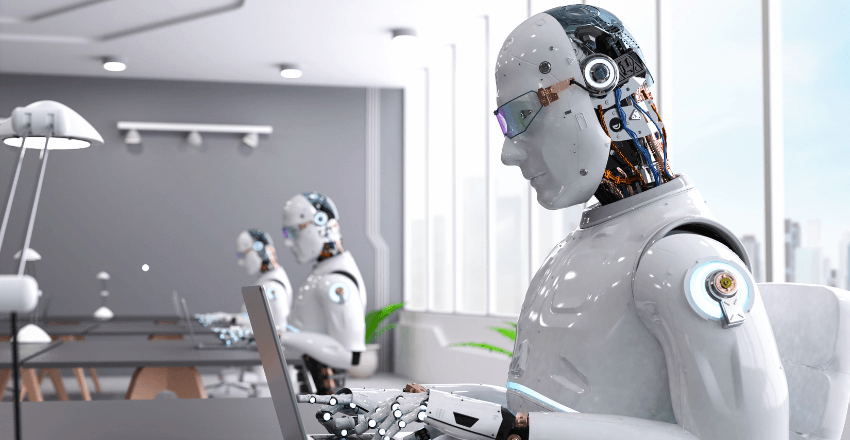
To work effectively with AI technologies, software developers need to acquire new skills and knowledge beyond traditional software development. Machine learning, natural language processing, and data science are some areas that developers may need to learn.
Many universities and training institutions are beginning to offer courses focused on AI in software development. For example, Carnegie Mellon University offers a Master of Science in Language Technologies that teaches students to build applications and systems that can understand and generate human language.
Stanford University offers a course on machine learning for software engineers.
Online learning platforms such as Coursera and edX also offer a variety of courses on AI in software development. These courses are typically designed to be accessible to beginners and cover topics such as neural networks, deep learning, and data analysis.
Professional development programs and bootcamps can also help developers stay current with the latest AI technologies and trends. Many companies offer in-house training programs for their employees to learn about AI and its applications in software development.
As AI continues to shape the future of software development, developers must be willing to adapt and continuously learn new skills.
Incorporating AI-related skills and knowledge into software development curricula and professional development programs can help ensure that developers are equipped with the necessary tools to work effectively with AI technologies.
The Role of AI and Human Developers
The question of whether AI can replace human software developers is not a simple one.
AI can automate many software development tasks, yet cannot replace human creativity, problem-solving, and intuition.
Successful AI integration in software development hinges on collaboration, leveraging unique strengths towards shared goals.
AI can assist and augment human developers, but it cannot replace them entirely.
As the field of software development continues to evolve with the advancement of AI technologies, it is important for developers to adapt and continuously update their skills and knowledge. This includes not only technical skills related to AI, but also skills related to collaboration, communication, and ethical considerations.
With a collaborative and responsible approach, the future of software development with AI is full of possibilities and potential advancements. It is up to us as developers to shape this future in a way that benefits both the industry and society as a whole.
Future Outlook: AI and the Evolution of Software Development
AI advances predict its growing, evolving role in software development. Notably, AI-human collaboration is increasing.
AI-powered development environments and tools might significantly expedite development processes.
For instance, an AI could analyze a codebase, recommending changes to enhance performance, security, or maintainability.
Similarly, AI could incorporate feedback from user testing and improve the user experience in real-time.
Another potential direction is the use of AI to address the challenge of software complexity. With the rise of cloud computing, mobile devices, and the Internet of Things, software systems are becoming increasingly complex.
AI could be used to analyze and optimize these systems, identifying patterns and correlations that are difficult for human developers to detect.
Impact on Jobs and Skills
As AI becomes more prevalent in software development, it is likely that the job market for software developers will undergo significant changes. However, it is important to note that AI is unlikely to entirely replace human developers.
Instead, it is expected that AI will augment and enhance the work of human developers, enabling them to focus on more creative and complex tasks.
The skills required for software developers are also expected to evolve. In addition to the existing skills of programming, debugging, and testing, software developers will need to have a solid understanding of AI technologies and be able to work effectively with them.
This will require continuous learning and a willingness to adapt to changing technologies and trends.
Challenges Ahead – Can AI Replace Human Software Developers
Despite the promising future of AI in software development, there are still significant challenges that need to be addressed. One of the biggest challenges is the potential for bias in AI algorithms, which can lead to unfair outcomes and perpetuate existing inequalities.
Developers will need to ensure that their AI models are trained on diverse datasets and regularly audited for bias.
Another challenge is the need to ensure that AI is used ethically and responsibly. This includes protecting user privacy and ensuring that AI is not used to make decisions that could harm individuals or society as a whole. Developers will need to be aware of these risks and take steps to mitigate them.
The future of software development is likely to be heavily influenced by AI. However, it is important that we approach this technology with caution and ensure that it is used responsibly and ethically.
By working together with AI, human developers can harness the full potential of this technology and create innovative and impactful software solutions.
Common Problems and Solutions – Can AI Replace Human Software Developers

1. Lack of Creativity
AI is efficient at tasks with defined boundaries and parameters, but it may struggle with creative problem solving, which is inherent to software development.
Consequences: The inability to create innovative solutions could lead to stagnated software development, lack of new features, and potential inefficiencies in the code.
Solutions: AI collaboration with human developers can be the key here. Let humans do the creative work, while AI handles mundane, repetitive tasks.
2. Understanding Context
AI has difficulty understanding context and nuance. This can be a significant problem when requirements are ambiguous or when it involves understanding the broader business context.
Consequences: Software developed could be inadequate or inappropriate for the task, leading to poor user experience or even operational problems.
Solutions: The use of natural language processing (NLP) and advancements in contextual understanding could help bridge this gap over time.
3. Emotionally Intelligent Communication
AI lacks emotional intelligence, which is essential for stakeholder communication and empathy-driven design in software development.
Consequences: Potential misunderstandings, miscommunication with stakeholders, and suboptimal user interface designs.
Solutions: Implement AI-human hybrid communication systems where AI handles routine communications while humans handle emotionally sensitive interactions.
4. Dealing with Unpredictable Scenarios
AI struggles with unpredictable scenarios or exceptions, something software developers encounter regularly.
Consequences: Software may contain bugs, lack essential features, or fail in unpredictable scenarios.
Solutions: Training AI on larger, diverse datasets, and incorporating reinforcement learning algorithms can help AI better handle unpredictability.
5. Ethical Considerations
AI can struggle with ethical considerations inherent in software development, such as privacy, security, and fairness.
Consequences: Ethically inappropriate or legally non-compliant software could result, with potential reputational damage or legal penalties.
Solutions: Incorporate ethical AI principles in AI training and operation, and ensure human oversight of critical ethical decisions.
6. Continual Learning
AI, as of now, isn’t very good at learning from its mistakes or learning incrementally over time without explicit re-training.
Consequences: Repeated mistakes in software development and slow progress over time.
Solutions: Research into lifelong learning AI models, which can learn and adapt over time without needing specific retraining sessions.
7. Dependency on Data
AI is data-driven, and the absence of quality data can affect the efficiency and effectiveness of an AI software developer.
Consequences: Software might not meet quality standards, contain bugs, or be inefficient.
Solutions: Data validation and regular data audits can ensure that the AI system is trained and operates on quality data.
8. Tacit Knowledge Assimilation
AI may struggle to assimilate and apply tacit knowledge, which is often unstructured and non-quantifiable, yet crucial to software development.
Consequences: Software solutions could lack depth and sophistication, limiting their real-world applicability.
Solutions: Use of knowledge-based AI systems and development of expert systems that can capture and utilize tacit knowledge.
9. Maintaining Developer Passion
AI lacks passion and personal interest, often driving factors for innovation in software development.
Consequences: Without passion, the software developed might not push boundaries or be ground-breaking.
Solutions: A hybrid system where AI takes over mundane tasks, freeing human developers to apply their passion where it truly matters.
10. Adapting to New Technologies
AI could struggle to adapt to new technologies and languages unless specifically trained.
Consequences: The developed software might be outdated or incompatible with the latest technologies.
Solutions: Implement continuous learning algorithms that adapt and learn new technologies as they emerge.
11. Regulatory Understanding
AI lacks understanding of regulatory nuances that may apply to specific software applications.
Consequences: Regulatory breaches could lead to legal penalties and harm the organization’s reputation.
Solutions: Build regulatory understanding into AI systems, using rule-based AI, or maintain human oversight for regulatory aspects.
12. Code Refactoring
AI might struggle with complex refactoring tasks required for efficient and clean code.
Consequences: Software might suffer from poor performance or excess resource consumption.
Solutions: Develop advanced machine learning algorithms that can recognize patterns and refactor code effectively.
13. Decision-making Under Uncertainty
AI finds it difficult to make decisions under uncertainty, a common occurrence in software development.
Consequences: Inaccurate decisions could lead to faulty software or projects going off-track.
Solutions: Incorporate Bayesian networks or other probabilistic models to help AI handle uncertain scenarios.
14. Interpretation of Non-verbal Communication
AI is unable to interpret non-verbal cues that often influence project requirements and team interactions.
Consequences: Misinterpretation could lead to development errors, team miscommunication, or client dissatisfaction.
Solutions: Use of video analysis AI or human assistance when non-verbal communication is crucial.
15. Handling Real-world Trade-offs
AI might struggle with real-world trade-offs, such as between software speed and quality.
Consequences: Unbalanced software that leans too much on speed or quality but not a suitable mix of both.
Solutions: Train AI on multi-objective optimization problems and use decision-making AI models to handle trade-offs.
16. Long-term Project Vision
AI lacks the ability to visualize and plan for a long-term project vision, integral for successful software development.
Consequences: Software projects might lack direction, leading to ineffective results or incomplete software solutions.
Solutions: Keep human project managers in the loop to manage long-term project vision, while AI handles the execution part.
Frequently Asked Questions – Can AI Replace Human Software Developers

Q: Can AI completely replace human software developers?
A: No, AI cannot completely replace human software developers. AI automates tasks and boosts efficiency, yet human creativity, problem-solving, and critical thinking remain vital for software development.
Q: What are the benefits of using AI in software development?
A: AI can improve productivity, speed up development processes, enhance code quality, and enable better decision-making in software development. It can also assist with tasks such as bug detection, code generation, and optimization.
Q: What are the limitations of AI in software development?
A: AI may fall short in certain areas and tasks that require human creativity, intuition, and subjectivity. Additionally, there are potential risks associated with relying solely on AI, such as bias in algorithms and privacy concerns.
Q: How can AI and human developers collaborate in software development?
A: AI can assist and augment human developers, rather than replacing them entirely. Human developers use AI to automate tasks, refine code, and analyze large data, retaining their unique creativity and problem-solving.
Q: What is the impact of AI on the job market for software developers?
A: AI’s rise in software development may displace tasks and roles, yet creates opportunities for developers with AI skills.The job market will likely evolve in response to this technological shift.
Q: What are the ethical considerations related to AI in software development?
A: Concerns exist about AI algorithm bias, data privacy, and developers’ duty to ensure ethical AI use. It is important for developers to consider these ethical considerations and implement appropriate safeguards when utilizing AI technologies.
“Can AI Replace Human Software Developers?” Join us in exploring this tantalizing question, as we navigate the intersection of machine intelligence and human ingenuity.
Jane Watson is a seasoned expert in AI development and a prominent author for the “Hire AI Developer” blog. With over a decade of experience in the field, Jane has established herself as a leading authority in AI app and website development, as well as AI backend integrations. Her expertise extends to managing dedicated development teams, including AI developers, Machine Learning (ML) specialists, and other supporting roles such as QA and product managers. Jane’s primary focus is on providing professional and experienced English-speaking AI developers to companies in the USA, Canada, and the UK.
Jane’s journey with AI began during her time at Duke University, where she pursued her studies in computer science. Her passion for AI grew exponentially as she delved into the intricacies of the subject. Over the years, she honed her skills and gained invaluable experience working with renowned companies such as Activision and the NSA. These experiences allowed her to master the art of integrating existing systems with AI APIs, solidifying her reputation as a versatile and resourceful AI professional.
Currently residing in the vibrant city of Los Angeles, Jane finds solace in her role as an author and developer. Outside of her professional pursuits, she cherishes the time spent with her two daughters, exploring the beautiful hills surrounding the city. Jane’s dedication to the advancement of AI technology, combined with her wealth of knowledge and experience, makes her an invaluable asset to the “Hire AI Developer” team and a trusted resource for readers seeking insights into the world of AI.
